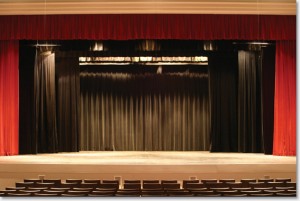
Daily News Egypt
After a recent cancellation of a concert in Minya during Eid and the ban of a song from the Egyptian film Abdo Mota, people are increasingly concerned about the state of freedom of expression. Egyptian director Mohamed El Sharkawy is speaking out against what he calls “intimidation” and the “deep state” at work.
Sharkawy’s play Asheqeen Torabek, or In Love with Your Soil, revolves around the revolution. Commentary on the current state of Egyptian politics is crucial to the play’s narrative.
After its debut the play was unexpectedly confronted with logistical issues pertaining to the availability of tickets and ease of access for journalists to attend. When Sharkawy inquired as to where the problem was, he was informed that the censorship committee found three to four scenes problematic.
Sharkawy was informed that the censors took issue with scenes in which actors wear long Salafi-style beards and one where Prime Minister Hesham Qandil is mentioned by name in a satirical manner.
“The censorship committee did not officially take any action against the play, but rather they informed me in what they called a ‘friendly manner’ what was to be removed. I did not want to wait until they started to ban it officially and react to that. I had to take action and not find myself in a position that I was bound by the law, Mubarak’s law, but the law nonetheless,” said Sharkawy.
Sharkawy is not protesting the Muslim Brotherhood or Islamists, but rather the state itself and more specifically the concept of the “deep state.” The concept comes from the idea of a “state within a state,” a network of relationships and interests often running counter to the interests of the general public.
“Before the revolution the state was very supportive of anything that was anti-Islamist and now they are against it. The ultimate issue here is hypocrisy. The same people are opposing something different simply because of who is in power. The play also has scenes that criticise secular and liberal forces but no one has asked me to remove them. Why is that?” asked Sharkawy.
Sharkawy stressed that not only were the scenes crucial to the play and his vision, but that they also criticised what was in the public sphere and what should be able to be criticised. “I did not address their personal issues and satirise famous cases of lapses of judgment, such as the Salafi MP who had a nose job [and pretended to have been mugged to explain his wound] because that is personal and not public. But this is politics and any opinion, as long as it does not infringe upon or disrupt general Egyptian values, should be allowed to be expressed in any way.
“Cases like Qandil’s proposition after visiting Ethiopia that we all wear cotton and share air conditioners is something that is fair to criticise; when a state official goes to solve a crisis and comes back with solutions which are incompetent at best. This may be my last chance to work in state theatre but it is important for people to know that the censorship is not only back, but that it could be worse than it was before and in the future they may not even know about these bans that are taking place in a supposedly post-revolutionary Egypt.”
On Saturday, a solidarity protest took place at the Balloon theatre where the play is staged, which included Sharkawy along with several actors, revolutionaries and media insiders such as Sabry Fawa, Mohamed El-Adl, Ahmed Doma and members of the Ultras football fans. The play is scheduled to go ahead without changes.




